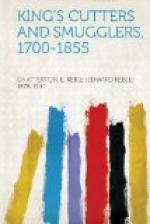According to the testimony of the Rev. John Smyth, who visited them in gaol, all the prisoners received the Holy Communion at ten o’clock, the morning after being sentenced to death. All the prisoners except the two Mills admitted that they deserved the sentence, but all the surviving six acknowledged that they forgave everybody. On January 19, 1748-9, they were executed. The two Mills were not hung in chains, but having neither friend nor relation to take them away their bodies were thrown into a hole near the gallows, into which also was placed Jackson’s body. Carter’s body was hung in chains on the Portsmouth Road, near Rake; that of Tapner on Rook’s Hill, near Chichester; those of Cobby and Hammond on the sea coast near Selsey Bill; so that from a great distance they could be observed across the sea by the ships as they went by east and west. Later on, John, the brother of Richard Mills, and one of the gang, was also arrested. When the above three judges were travelling down to Chichester for the trial of the seven men, John had intended waylaying their lordships on Hind Heath, but his companions had refused to support him. But soon after his father’s and brother’s execution he met with a man named Richard Hawkins, whom he accused of having stolen two bags of tea. Hawkins denied it, and was brutally and unmercifully thrashed to death in the Dog and Partridge Inn at Slindon Common, his body being afterwards carried a dozen miles, thrown into a pond, with stones attached, and then sunk. John Mills was convicted and hanged at East Grinstead, and afterwards remained hanging in chains on Slindon Common. Other members of the gang were also arrested, tried at the same assizes as highwaymen, and then executed.
* * * * *
Later on, two of the smugglers who had given evidence against the men that were hanged at Chichester, gave information also, which led to the arrest of Kingsmill, Perin, and two others who had been concerned in breaking open the Poole Custom House. Kingsmill, Perin, and one other were hanged at Tyburn in April of 1749; the other man, however, was pardoned. Thus at length this dreaded Hawkhurst Gang was broken up.
CHAPTER VI
THE REVENUE CRUISERS
We drew attention some time back to the assistance occasionally rendered by soldiers when the Riding officers were about to arrest smugglers. Early in the year 1740, or about the close of 1739, Thomas Carswell, one of the Revenue officers stationed at Rye, was murdered, and a corporal and three dragoons whom he had taken to his assistance were badly wounded, and a large quantity of tea that had been seized was rescued. It was after this incident that Revenue officers of this port—perhaps the most notorious of all the south-east smuggling territory—were ordered that in future when they went forth to make seizures they were to have with them an adequate military force, and to this end they were to make previous arrangements with the commanding-officer of the forces in that district.




